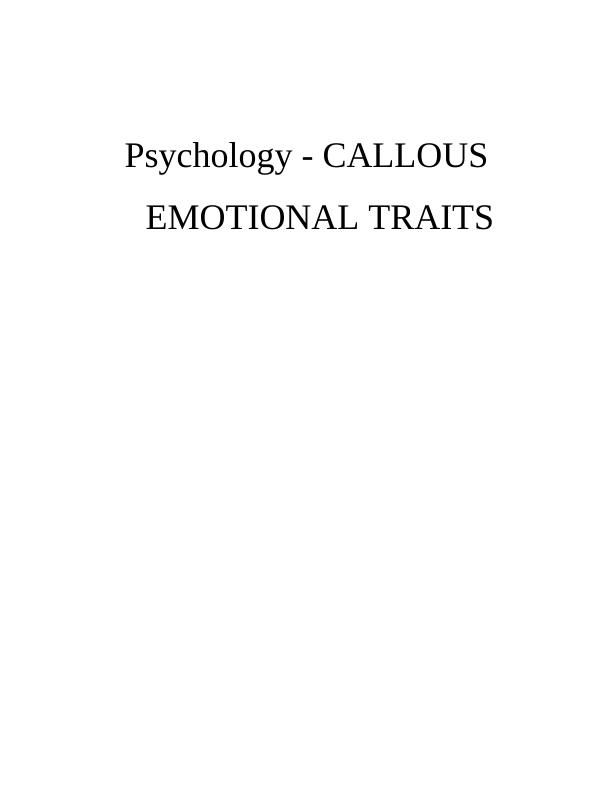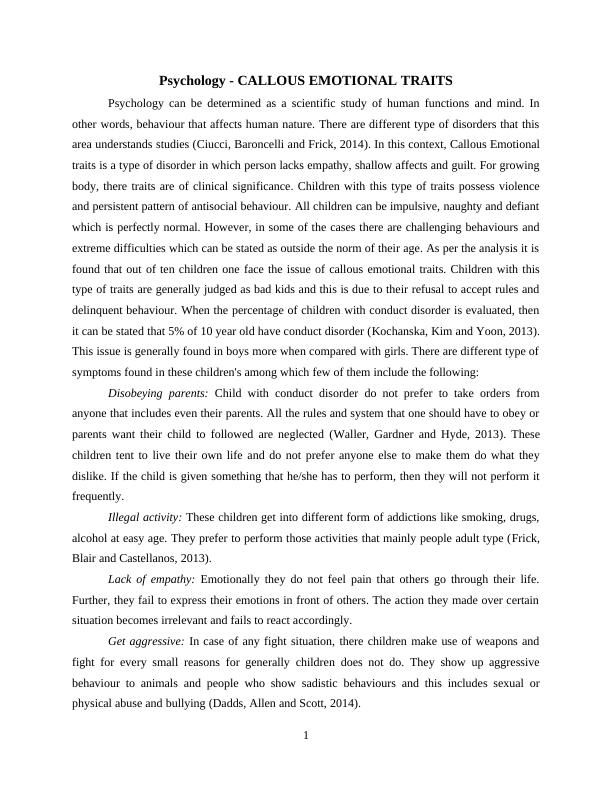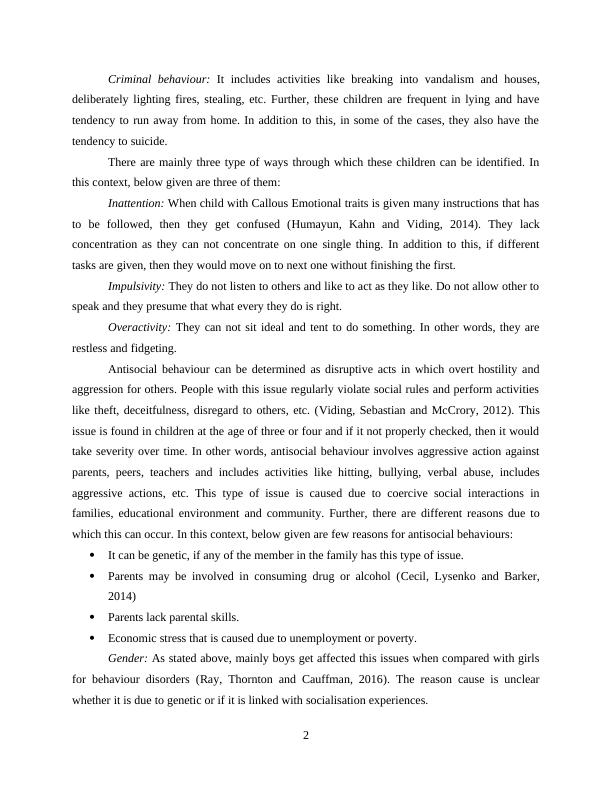Ask a question from expert
Psychology - Callous Emotional Traits
8 Pages2882 Words362 Views
Added on 2020-02-05
Psychology - Callous Emotional Traits
Added on 2020-02-05
BookmarkShareRelated Documents
Psychology - CALLOUSEMOTIONAL TRAITS

Psychology - CALLOUS EMOTIONAL TRAITSPsychology can be determined as a scientific study of human functions and mind. Inother words, behaviour that affects human nature. There are different type of disorders that thisarea understands studies (Ciucci, Baroncelli and Frick, 2014). In this context, Callous Emotionaltraits is a type of disorder in which person lacks empathy, shallow affects and guilt. For growingbody, there traits are of clinical significance. Children with this type of traits possess violenceand persistent pattern of antisocial behaviour. All children can be impulsive, naughty and defiantwhich is perfectly normal. However, in some of the cases there are challenging behaviours andextreme difficulties which can be stated as outside the norm of their age. As per the analysis it isfound that out of ten children one face the issue of callous emotional traits. Children with thistype of traits are generally judged as bad kids and this is due to their refusal to accept rules anddelinquent behaviour. When the percentage of children with conduct disorder is evaluated, thenit can be stated that 5% of 10 year old have conduct disorder (Kochanska, Kim and Yoon, 2013).This issue is generally found in boys more when compared with girls. There are different type ofsymptoms found in these children's among which few of them include the following:Disobeying parents: Child with conduct disorder do not prefer to take orders fromanyone that includes even their parents. All the rules and system that one should have to obey orparents want their child to followed are neglected (Waller, Gardner and Hyde, 2013). Thesechildren tent to live their own life and do not prefer anyone else to make them do what theydislike. If the child is given something that he/she has to perform, then they will not perform itfrequently.Illegal activity: These children get into different form of addictions like smoking, drugs,alcohol at easy age. They prefer to perform those activities that mainly people adult type (Frick,Blair and Castellanos, 2013).Lack of empathy: Emotionally they do not feel pain that others go through their life.Further, they fail to express their emotions in front of others. The action they made over certainsituation becomes irrelevant and fails to react accordingly.Get aggressive: In case of any fight situation, there children make use of weapons andfight for every small reasons for generally children does not do. They show up aggressivebehaviour to animals and people who show sadistic behaviours and this includes sexual orphysical abuse and bullying (Dadds, Allen and Scott, 2014).1

Criminal behaviour: It includes activities like breaking into vandalism and houses,deliberately lighting fires, stealing, etc. Further, these children are frequent in lying and havetendency to run away from home. In addition to this, in some of the cases, they also have thetendency to suicide.There are mainly three type of ways through which these children can be identified. Inthis context, below given are three of them:Inattention: When child with Callous Emotional traits is given many instructions that hasto be followed, then they get confused (Humayun, Kahn and Viding, 2014). They lackconcentration as they can not concentrate on one single thing. In addition to this, if differenttasks are given, then they would move on to next one without finishing the first.Impulsivity: They do not listen to others and like to act as they like. Do not allow other tospeak and they presume that what every they do is right.Overactivity: They can not sit ideal and tent to do something. In other words, they arerestless and fidgeting.Antisocial behaviour can be determined as disruptive acts in which overt hostility andaggression for others. People with this issue regularly violate social rules and perform activitieslike theft, deceitfulness, disregard to others, etc. (Viding, Sebastian and McCrory, 2012). Thisissue is found in children at the age of three or four and if it not properly checked, then it wouldtake severity over time. In other words, antisocial behaviour involves aggressive action againstparents, peers, teachers and includes activities like hitting, bullying, verbal abuse, includesaggressive actions, etc. This type of issue is caused due to coercive social interactions infamilies, educational environment and community. Further, there are different reasons due towhich this can occur. In this context, below given are few reasons for antisocial behaviours:It can be genetic, if any of the member in the family has this type of issue. Parents may be involved in consuming drug or alcohol (Cecil, Lysenko and Barker,2014)Parents lack parental skills.Economic stress that is caused due to unemployment or poverty.Gender: As stated above, mainly boys get affected this issues when compared with girlsfor behaviour disorders (Ray, Thornton and Cauffman, 2016). The reason cause is unclearwhether it is due to genetic or if it is linked with socialisation experiences.2

End of preview
Want to access all the pages? Upload your documents or become a member.
Related Documents
Callous-Unemotional Traits & Conduct Disorderlg...
|9
|643
|75
Aggressive Behaviour in Children Assignmentlg...
|11
|2355
|144
Protect and Safeguard Vulnerable Group : Reportlg...
|9
|2667
|53
Child Abuse or Neglect: Vulnerable Groups and Impact on Health and Well-beinglg...
|1
|1313
|67
Aggressionlg...
|7
|1098
|86
Prevention of Maltreatment Scenarioslg...
|4
|631
|488